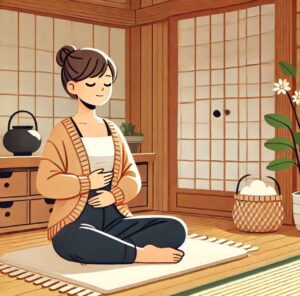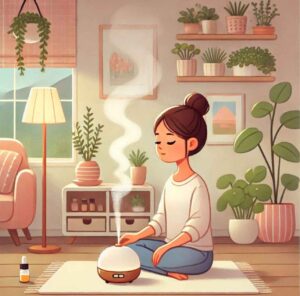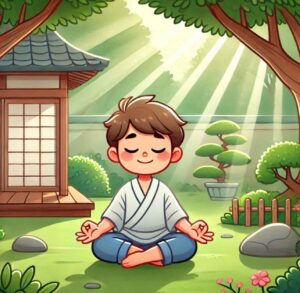Welcome Blessings!
(Tap 🔽 to see more topics!)


How to reduce stress? Our mind is like a busy street. Sometimes, it’s a calm stroll and other times, it’s a rush hour with honking thoughts and traffic jams of worry. That feeling of your brain spinning its wheels stuck in a loop of “what ifs” and “should haves.” Maybe you’re replaying a conversation repeatedly or dreading something that hasn’t happened yet. It’s like your brain is a record player with a skip, stuck on the same annoying track. This mental loop, this constant replaying, that’s what we call rumination. Honestly, it’s exhausting!
Instead of being a helpful tool, your mind has become a crowded attic filled with old boxes you can’t seem to throw away. You’re trying to find something useful, but you’re just tripping over dusty memories and anxieties. This constant mental clutter makes it impossible to focus, makes relaxing feel like a distant dream, and even messes with your sleep. Your brain’s alarm system is stuck in the “on” position, constantly sending stress signals.
The good news is you can clear out that attic. You can learn to quiet the street. That’s where mindfulness comes in. Think of mindfulness as a mental broom, gently sweeping away the unnecessary clutter. It’s about learning to notice your thoughts without getting swept away by them, like watching clouds drift across the sky. Instead of getting caught in the storm, you learn to observe it.
It isn’t about some complicated meditation retreat or some fancy guru-led practice. It’s about simple, everyday tools you can use to take back control of your mind. Today, you will learn eight easy-to-use tips that can help you declutter your mental space. These aren’t magic tricks but practical steps to help you find more peace, focus on what matters, and start living a more fulfilling life, one mindful moment at a time.
Seriously, moving around makes a huge difference. Your brain and body are connected, and when your brain’s stuck in a loop, getting your body moving can hit the “reset” button. For sure you also feel that tight tension when you’re stressed or anxious. Physical activity is an effective way to release that. It’s like shaking off a bad mood. Plus, there’s actual science behind it:
Now, you don’t have to train for a marathon. It’s about finding something you enjoy, something that fits your life. Below are a few ideas, but really, anything that gets you moving counts:
The key is to make it something you look forward to, not something that feels like a chore. Even a little movement can make a big difference in how you feel physically and mentally.
It’s funny. We do it all the time without even thinking, but when you think about it, it’s a super powerful tool. Seriously, it’s a cheat code for calming down. You know that feeling when you’re super stressed, and your chest gets tight? That’s your body’s “fight or flight” mode kicking in. Deep breathing tells your body, “Chill out, everything’s okay.” It’s like pressing a reset button.

So, how do you do it? It’s straightforward:
You can do this anywhere, anytime! In your car, at your desk, or even in the grocery store line. No one will know. It’s a quick, easy way to bring a little bit of calm into your day. Honestly, just try it for a minute or two; you might be surprised at how much better you feel.
Who doesn’t love a good tune? It’s more than just background noise, though. There’s a real science behind how music affects us.
So, how do you use this to your advantage? It’s all about picking the right soundtrack for your mood.
It’s like having a personalized emotional toolkit at your fingertips. Just experiment and see what works best for you. Don’t overthink it. Just put on what you love.
We’ve all had that experience where a particular smell instantly changes our mood, right? Like the smell of fresh coffee in the morning or the ocean air at the beach? Aromatherapy takes that power of scent and uses it intentionally to help us feel better, both mentally and physically.
Think of it as using nature’s little helpers. These aren’t just “nice smells”. They’re natural oils extracted from plants that affect our brains and bodies. It’s cool when you think about it.
Examples

How to use Aromatherapy:
It’s a simple, natural way to give your mood a little boost or a calming nudge. And honestly, who doesn’t love a good smell?
We all know that feeling when your brain wants to focus on the negative. It’s like your brain has a favorite radio station that only plays sad songs. But the thing is, you can change the station.
Think of it like your brain is a garden. Negative thoughts are like weeds, and positive thoughts are like flowers. If you let the weeds take over, that’s all you’ll see, but you can start planting some flowers.
It’s about training your brain to see the good stuff. In addition, it’s not about pretending everything’s perfect but finding a more balanced view. It’s like wearing rose-tinted glasses sometimes to break your brain from all the doom and gloom. Although it takes practice, it makes a real difference.
Let’s talk about coffee. Most of us love it! It gets us going, but sometimes, it’s not our friend. That jolt of energy? Yeah, it can also crank up the anxiety. It’s like turning up the volume on your brain, and sometimes, you need to turn it down.
Honestly, it’s a balancing act. If you’re finding it hard to calm your mind, it may be time to examine your caffeine intake.
It’s not about giving up coffee completely (unless you want to!), but just being mindful of how it affects you. Sometimes, a simple change like this can make a real difference in how calm and clear your mind feels.
Sometimes, we’re so busy just doing that we don’t realize how cluttered our lives have become. It’s easy to fall into the trap of saying “yes” to everything or holding onto stuff “just in case.” But honestly, that stuff, those commitments, they weigh us down. They eat up our time, energy, and mental space.
So, how do we fix it? It’s about making choices and being brave.
It’s not about being perfect, but it’s about being intentional. It’s about creating a life that supports your well-being instead of draining it. You deserve a life that feels spacious, not cramped.
Grab a pen and paper, or your phone, or whatever you’ve got, and… write. Seriously.
Tips to Get Started:
Honestly, it doesn’t have to be perfect. No one’s grading your grammar. It’s just about getting those thoughts out and giving your mind a little breathing room. It’s about being present with what you are feeling.

To wrap it up, we’ve talked about how rumination, that mental loop we all get stuck in sometimes, can weigh us down. It’s like carrying a backpack full of “what ifs” and “should haves,” making everything feel heavier. And it’s not just about feeling stressed… it seeps into everything – your sleep, your mood, even how well your body fights off colds.
But remember, you’re not stuck with that heavy backpack forever. Mindfulness, that simple act of noticing what’s happening without judging it, is like learning to unpack that backpack, one thought at a time. It’s about permitting yourself to be in the present instead of constantly living in the past or future.
Keep in mind, you’re not trying to stop the thoughts from coming because that’s impossible. You’re just learning to step back and watch them go by like clouds in the sky. Honestly, it makes a huge difference. Also, we’ve shared some simple tools, like writing things down or taking a few deep breaths, that can help you get started. These aren’t quick fixes but little things you can do daily to calm your mind.
Now, if you’re thinking, “Okay, this sounds good, but where do I start?” Don’t worry… you don’t have to become a meditation master overnight. Just start small. If you found this helpful or have any questions, comment below. Let us know what resonates with you and what you will try. Thank you for reading, and see you at the next one!
Additional References:
Scott, E. 2021, December 4. How to clear your mind for reduced stress. Verywell Mind. https://www.verywellmind.com/how-can-i-clear-my-mind-3144602
How decluttering can reduce stress and improve focus. 2021, October 25. WebMD. https://www.webmd.com/mental-health/mental-health-benefits-of-decluttering
Azish, N. 2017, November 20. How to declutter your mind: 10 practical tips you’ll want to try. Forbes. https://www.forbes.com/sites/nomanazish/2017/11/19/how-to-declutter-your-mind-10-practical-tips-youll-actually-want-to-try/
Smith, E. E., & Alloy, L. B. 2016, April 20. Rumination: A problem in anxiety and depression. Psychology Today. https://www.psychologytoday.com/us/blog/depression-management-techniques/201604/rumination-problem-in-anxiety-and-depression